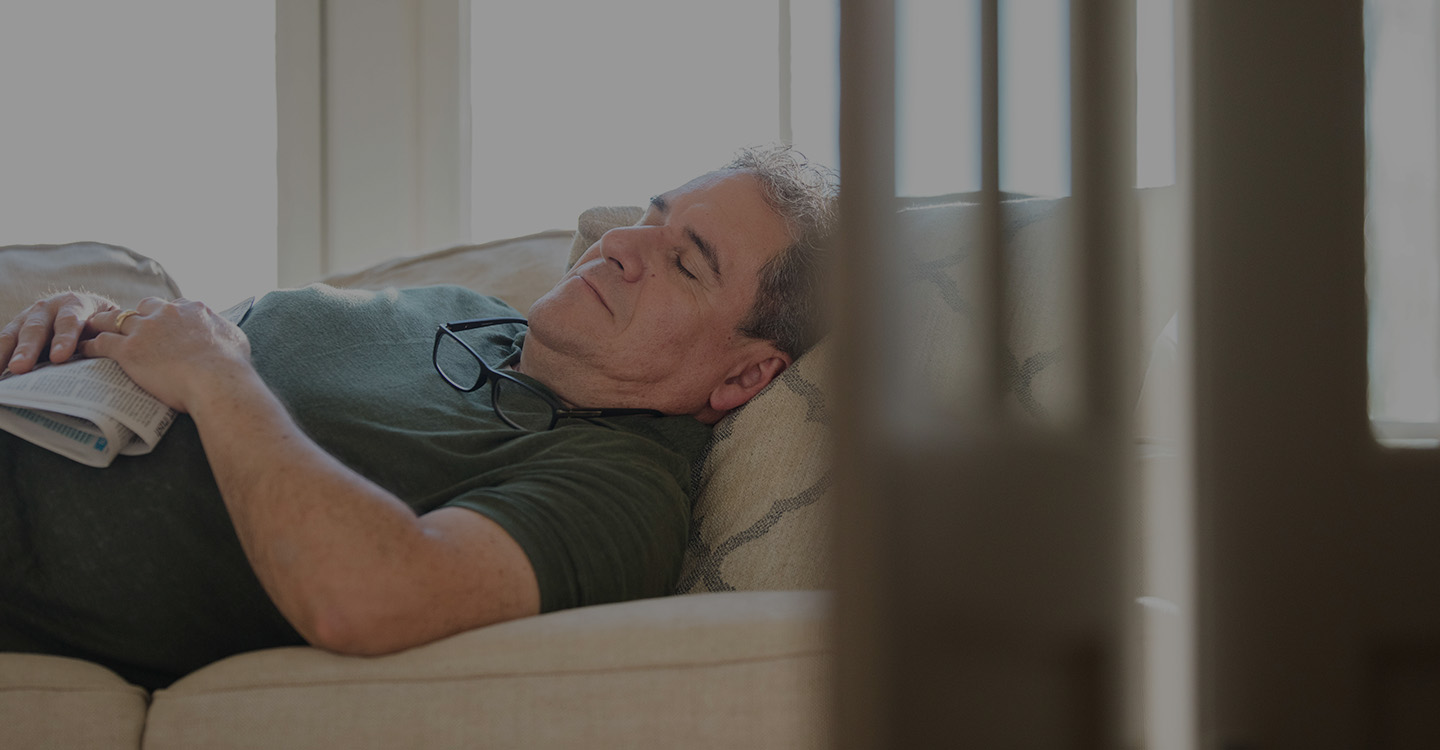It’s a New Day in Sleep Medicine

When you lack the energy and clarity to give life your all, we’ll uncover what’s behind those sleepless nights. Whether you’re struggling to fall asleep, waking repeatedly or having nightmares, most sleep disorders can be easily treated.
Expert Care Made Easily Accessible

Recognized Expertise
You’ll be surrounded by a team that meets the highest of standards: board-certified sleep specialists who are endorsed and nationally accredited by the American Academy of Sleep Medicine (AASM).

Sleep Study Diagnosis
Our sleep centers are equipped with everything we need to diagnose your sleep disorder. While you rest, we’ll record and monitor sleep patterns, heart activity, breathing and body movements.

Convenient Care
There’s no need for you to keep feeling groggy and exhausted all day. Diagnosing and treating your sleep disorder is easy and convenient with our five centers located across Central Florida.
Understanding Diagnosis and Treatment of Sleep Disorders
Successfully getting to the root of your sleep disorder and creating the right treatment plan requires having an expert team behind you: surgeons and specialists, doctors and nurses, therapists and caregivers. All working together with the same goal in mind — providing you the best possible treatment supported by the most up-to-date technologies possible.
- Sleep Apnea
- Narcolepsy
- Restless Legs Syndrome (RLS)
Sleep Apnea
You make it a point to get a full night’s sleep, and yet you still feel exhausted at work, during get-togethers or while playing with your kids. If this sounds like you, you may be suffering from sleep apnea, a chronic disorder that occurs when you have pauses in breathing while you sleep. It often goes untreated, which can lead to dangerous health conditions.
There are two types of sleep apnea:
- Central Sleep Apnea — A rare condition not caused from a blockage of air, but rather a failure by the part of your brain that controls breathing
- Obstructive Sleep Apnea (OSA) — The most common type of sleep apnea, caused by an airway blockage in the throat; often associated with loud snoring
Signs that you may be suffering from sleep apnea include:
- Decreased Memory
- Dry Mouth
- Frequent Bathroom Breaks During the Night
- Grogginess When You Wake Up and Throughout the Day
- Lack of Concentration
- Mood Swings
- Morning Headaches
- Sore Throat
If you’ve been experiencing any of these symptoms, it’s time to take control of your condition and schedule time with one of our sleep apnea specialists. Remember, help is just one call away.
There are a number of effective treatments available for sleep apnea, including:
Non-surgical Treatments:
- Conservative, Non-surgical Therapies — Treatments may include avoiding alcohol and sleeping pills, changing sleep positions to help promote regular breathing, quitting smoking and avoiding sleeping on your back.
- Continuous Positive Airway Pressure Device (CPAP) — This device is a bit like a mask you wear comfortably over your nose or mouth to provide a steady stream of airflow during sleep.
- Custom Oral Appliances — These jaw advancing devices (JAD) or mandibular advancement devices (MAD)are custom-made using a plastic-like mold to form to the specific shape of the patient’s teeth and mouth.
Surgical Procedures:
- Genioglossus — This surgical procedure is effective in treating OSA, with success rates of above 50 percent. It involves an attachment that pulls the base of the tongue forward and down to increase the size of the airway.
- Hyoid Suspension — This procedure, which can be completed in less than one hour, anchors the hyoid bone in place, reducing airway blockage.
- Inspire® Upper Airway Stimulation Therapy — This may be a treatment option for patients who can’t use a CPAP or aren’t getting consistent benefit from it. It’s a small device implanted under the skin (on back of neck and chest) during a minimally invasive outpatient procedure. As you sleep, the Inspire system syncs with your breathing patterns and delivers mild stimulation to keep your breathing passages open. Patients control it via a simple remote.
- Transoral Robotic Surgery (TORS) — A procedure in which a robot-guided endoscope is employed to help treat sleep apnea. We’re proud to be the first network in Central Florida to use TORS for treating sleep apnea.
For mild cases, a few small lifestyle changes, like weight loss, limiting alcohol consumption and quitting smoking can make a big difference.
Narcolepsy
We know the reality of living with narcolepsy can be unnerving, but our sleep experts can help you control it with proper treatment. If you’re unsure whether you have narcolepsy, below are a few common symptoms to watch for:
- Excessive Daytime Sleepiness
- Hallucinations That Occur When Waking or Falling Asleep
- Inability to Talk or Move Momentarily When Waking or Falling Asleep
- Lack of Energy and Concentration
- Sudden Loss of Muscle Tone or Control
Other signs of narcolepsy include automatic behavior without conscious awareness, disrupted nighttime sleep, depression, vision problems, eating binges, weak limbs and difficulty handling alcohol.
To effectively treat narcolepsy, our sleep experts need to understand the underlying cause. First, we’ll guide you through creating a detailed sleep history and health evaluation. Next, we may recommend a series of screenings and tests to get to the root of your disorder. You may be asked to undertake one or more of the following:
- Keeping a Sleep Journal to Record Your Sleep Pattern for One to Two Weeks
- Coming In for an Overnight Sleep Study
- Taking a Hypocretin Test to Check the Level of the Chemical That Regulates REM Sleep
- Blood Tests to Detect Genetic Mutations
From there, we’ll create a personalized treatment plan to help you get your sleep disorder under control. Treatment options for narcolepsy may include:
- Prescription Medications — Including central nervous system stimulants (e.g., armodafinil, dextroamphetamine and methylphenidate), which treat excessive daytime sleepiness, and antidepressants (e.g., SNRIs, SSRIs and tricyclic antidepressants) to treat cataplexy, sleep paralysis and hallucinations
- Proper Diet and Exercise — Eating light, vegetarian meals during the day, avoiding heavy meals before important activities and remaining active can help some patients perform better at work or school
- Nap Therapy — Taking two or three naps per day may help control sleepiness and maintain alertness
Restless Legs Syndrome (RLS)
If you suspect you have restless legs syndrome, you’re not alone: Up to one in 10 Americans are affected by this neurological movement disorder. The exact cause of RLS is still unknown, though it’s believed to be genetic.
Additional signs and symptoms of RLS include:
- Uncomfortable, Sometimes Painful, Sensations in the Legs
- Uncontrollable Urge to Move the Legs
- Tingling, Sometimes Throbbing Feelings in the Legs
- Worsened Symptoms During Periods of Relaxation or Sleep
These symptoms typically worsen during periods of relaxation, disrupting sleep, which in turn only aggravates the sensations even more.
Below are a number of conditions that may lead to RLS:
- Diabetes
- Iron Deficiency
- Kidney Failure
- Multiple Sclerosis
- Parkinson’s Disease
- Peripheral Neuropathy
- Pregnancy (Particularly in the Last Trimester)
- Rheumatoid Arthritis
Treatment options for RLS include managing lifestyle factors, such as:
- Decreasing or Eliminating Caffeine, Alcohol and Cigarettes
- Hot Baths and/or Use of Heating Pads and Ice Packs
- Maintaining Regular Sleep Schedules
- Moderate Exercise
- Massage
- Using Nutritional Supplements Such as Iron, Magnesium and Folate
For your safety and well-being, and to make sure you get the best possible outcome, you should consult with your neurologist before making any major dietary or exercise changes.
Additional treatment options may include the following medications:
- Anticonvulsants — Decreases the unpleasant sensations of RLS in close to two-thirds of patients
- Benzodiazepines — Used to treat anxiety, insomnia, muscle spasms and help induce sleep
- Ropinirole and Pramipexole — Medications that act on dopamine receptors
- Rotigotine — Given as a transcutaneous patch to help restore dopamine levels in the brain
With help from our team of specialists, you can experience a drastic reduction in your symptoms through a healthy mix of nutritional meals, medical therapies and exercise therapies customized to your specific needs.





